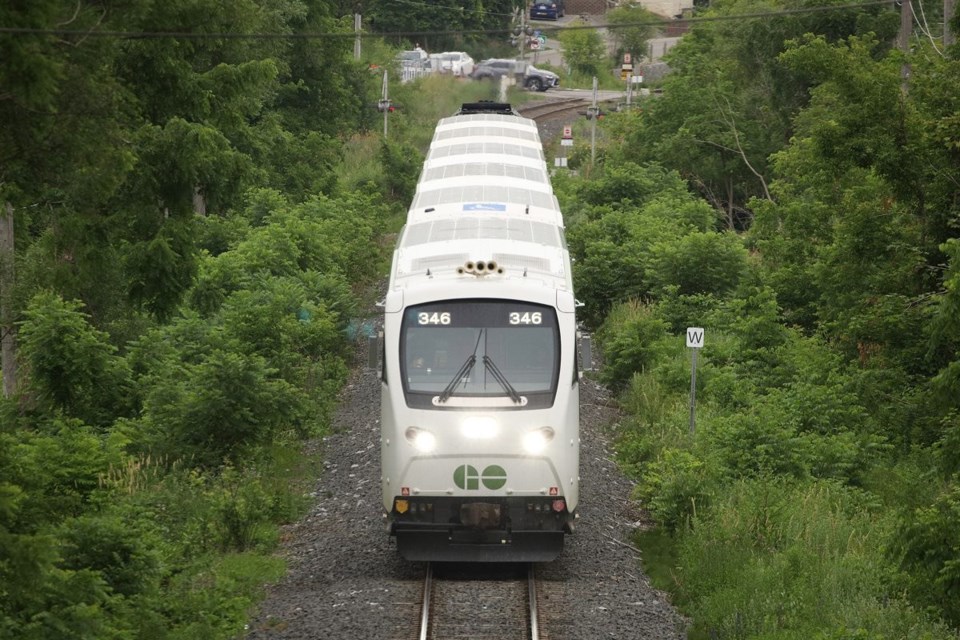Residents will have a while to wait yet on when they can expect a major commuter disruption at the Wellington Street rail crossing in Aurora.
At a meeting hosted by Ward 1 Councillor Ron Weese, Metrolinx representatives told residents they have not yet determined a timeline on when they will start digging a vehicular underpass ahead of their planned two-way all-day 15-minute train service, but assured residents that communication will be key with the community.
“Station work is underway,” said Metrolinx representatives gathered in council chambers before more than 50 residents, Councillor Weese and Ward 3 Councillor Wendy Gaertner. “As far as Wellington is concerned, one of the things we’re doing is looking at every level crossing in the network…and part of the conclusion would be a view on what grade separation on Wellington would look like. As those plans move forward, and I don’t have a date to help you with in terms of when that might occur, we will go through the environmental assessment process and that will bring consultation back to the town.”
Laying of the double tracks necessary for the all-day two-way goals, they added, is “several years away.”
During the session, Councillor Weese posed several questions received from constituents ahead of the meeting to the Metrolinx representatives, and residents in attendance had the chance to pose questions of their own. Questions from the audience ranged from noise to what the impact of construction might have to property values.
One issue voiced by Councillor Weese on behalf of the residents was exploring the future of level crossings outside of Wellington Street, such as those at Centre Street and St. John’s Sideroad.
“St. John’s is an important level crossing,” said Weese. “It’s important for you (Metrolinx) because it is a regional road as well and you will be doing the changes in there to make sure the level crossing is safe for both pedestrian and vehicular, but one we have in our town [at] Engelhard, is that a different animal?”
Metrolinx responded that “all level crossings are safe if they are used correctly.”
“What we’re trying to do is make them safer,” they said. “We’re trying to enhance that. We have a number of techniques now with additions we can make to level crossings [such as] vegetation or lines. There are relatively modest things you can do to make the crossings safer still and some of those allow whistle cessation to support that.”
When it came time for audience questions, many of those who spoke were looking firmly ahead to the future.
“One of the things that I have been observing in this presentation is it seems to assume traffic generally heads south downtown but with the proposed changes to York Region we know it may be the reverse with a lot of people even from Aurora, Oak Ridges and Richmond Hill travelling north to work,” said traffic safety advisory dommittee member Lil Kim. “What I see is there is a lot of issues for cyclists and people in wheelchairs. If it is an overpass it is harder for wheelchair riders. If it goes underneath [the rail tracks] there is ponding and it prohibits cycling.”
Resident Neil Asselin told fellow attendees that “growth is painful and we all have to go through that,” but suggested people should embrace the change, even if it causes some short-term difficulty. But, with change, there needs to be cohesive planning for all, he contended.
“People are afraid of change and I appreciate your honesty tonight – not necessarily sugar-coating, but it will be painful throughout the process,” he said. “I use transit and I understand that sometimes buses aren’t full, sometimes the trains aren’t full, but every one of those people on that train or on that bus needs to get somewhere. I believe that as we grow Aurora has to grow, we have to have more people who will want to be in more places. It’s hard to travel across York Region. I moved here from Toronto [where] I cycled everywhere, I didn’t have a driver’s licence until I was 30, so I say bring it on.
“I am sorry to all my friends here tonight who will be inconvenienced. I will be one of you and I want to remind the people who are in municipal government and also in our Town Hall that they also share a responsibility with Metrolinx so when roads are closed it’s up to you to make sure the detours are safe. Currently I have a detour in my neighbourhood, they’re putting in a watermain, and nobody has looked at how cars are travelling throughout the neighbourhood. People are not stopping at stop signs.
"We have unsafe car infrastructure in this town and we have never addressed it. That’s why we don’t have tunnels under our train tracks because we expanded and expanded for cars, never thought about pedestrians, crossed maybe at level crossings or ran across the tracks because there was no fence. But that was an illegal activity and I think our municipality should hold hands with Metrolinx and stop playing victim. You are the leaders here. Metrolinx is working on a project and trying to deliver something for the future. It is going to take time to get there but in 50 years people will be using this corridor.”
Brock Weir is a federally funded Local Journalism Initiative reporter at The Auroran
